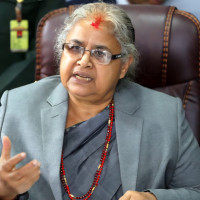- Sunday, 30 November 2025
Winter heightens cases of heart disease
Kathmandu, Dec. 18: A large crowd of men and women of different ages could be seen sleeping in the cold, cemented floors braving the winter cold. A few of them were with children. At one glance you think the place is Dharmasala, but it is Sahid Gangalal National Heart Centre (SGNHC) in Kathmandu. With the drop in temperature, the hospital is witnessing rise in the number of heart patients on a daily basis.
Jaitunya Sah,30, from Birgunj was seen on SGHNC premises with her one-year-old baby. She had arrived at the hospital with her husband and the child on Friday to treat her heart problem. “I need to see the doctor anyhow on Sunday, so to wait for my turn, rather than going anywhere, we decided to spend the night on the floor,” she said. The space for attendees was already packed, so we spent the night on the floor, said Sah.
Another person, Ram Chandra Rimal, 56, from Nuwakot, whose wife was undergoing heart surgery was found packing his mats after spending the night in the hospital corridor. Yes, there is space for attendees, but I feel exhausted to sleep in a crowded place, said Rimal.
The country’s biggest heart hospital sees an average of 550-700 patients daily in general outpatient department (OPD) and around 100 patients in paying OPD, of which 50-60 patients visit in emergency department, according to Dr. Chandra Mani Adhikari, consultant cardiologist and Director of SGHNC. The hospital is also providing paying OPD services on Saturday.
“Besides, attendees of in-patients, OPD patients also spend their day and night inside the hospital premises.” Though we have provided space for attendees, they are reluctant to sleep there and are found sleeping on the floor, he added.
Though the place is not well facilitated, we have managed to settle attendees taking Rs. 100 for maintaining cleanliness, said Dr. Adhikari. The hospital provides full range of medical and surgical care to the needy heart patients based on urgency.
Risk of complications in winter
Radhika Poudel, (name changed), a 65-year-old, woman from Kaski was waiting her turn for heart surgery at Manmohan Cardiothoracic Vascular and Transplant Centre (MCVTC). “Doctors had said that I need to undergo heart surgery four years ago,” she said. I just ignored the pain for these years. I am here with my sons as they could not bear to see my pain, she added.
“My heart ache happens more during winter. I usually experience unbearable chest pain with the drop of temperature,” she added.
According to Dr. Anil Bhattarai, Cardiac Surgeon at MCTVC, those who have heart disease may get complications during winter. If the patients are exposed to cold, their condition may get worse and need doctors’ guidance.
The patients also need to keep their hypertension in check to reduce the complications, suggested Dr. Bhattarai. Heart patients above 40 years, who have undergone heart surgery, heart transplant, changed heart valve, irregular heartbeats and congenital heart defects are more vulnerable during the winter, according to Dr. Bhattarai.
According to doctors, heart patients should check their cardiac and mental stress levels in winter. Heart patients may get an attack due to irregular meals, skipping regular dose of medicines and indulgence in smoking and drinking and stress.
Choose day walk
As the temperature is falling, doctors have advised avoiding morning walks. According to cardiologists, freezing temperatures could put people at higher health risks, including heart attack.
Various studies have shown that more incidents of heart attacks occurred around the world as temperatures dropped. According to Heart Research UK, when the temperature falls, heart must work harder to keep you warm which increases your heart rate and an increased heart rate ups the risk of a heart attack.
According to Dr. Om Murti Anil, senior cardiologist at National Cardiac Centre, people need to walk but the concern is just to change the timing. It is very healthy to go on a regular walk under the sun, he added.
Patients of high blood pressure, high cholesterol, diabetes and heart disease are highly vulnerable during the winter, said Dr. Anil. They should prefer day walk and indoor exercises in winter to reduce the risk of heart attack, stroke and cardiac arrest, he added.
Risk of heart attacks among youth
According to doctors, it is imperative to not ignore irregular discomfort or pain in chest. Dr. Adhikari informed that a person is at high risk of heart attack if anyone experiences chest pain for more than 12 hours.
“Negligence on health issues are the major risk factors of heart attack among the young people,” according to doctors.
Heart attacks are now common among people below 40 years of age and not only in old people where apart from factors such as high blood pressure, poor eating habits, lack of exercise and stress can play a havoc with your heart, said Dr. Adhikari.
According to Dr. Adhikari, 11 per cent of heart attacks take place among people below 40 years of age. It will be imperative to take utmost care of your heart during the winter and lead a healthy life to keep heart attack at bay, he suggested.
According to Dr. Adhikari, those who consume tobacco, smoke, lead a sedentary lifestyle, and have high blood pressure or high cholesterol are at risk of suffering a heart attack during the winter.
Talking about how the cold weather can impact the heart, doctors said, “A decline in temperatures generally thickens the blood, which increases blood pressure and also causes blood vessels to narrow. As a result, the heart needs to work harder to force the blood through the narrow veins and arteries. This spikes blood pressure and uncontrolled blood pressure is a risk factor for heart attack or stroke.”
Doctors have suggested to stay indoors to keep the body temperature regulated, eat small, healthy and regulated meals at reasonable intervals, limit the intake of salt, avoid cold beverages, alcohol, highly saturated fast foods and junk to keep the heart healthy.
Similarly, they have suggested not ignoring minor symptoms such as discomfort in the chest, sweating, breathlessness and pain in the neck, jaws or shoulders, and swelling in feet during the winter.

















